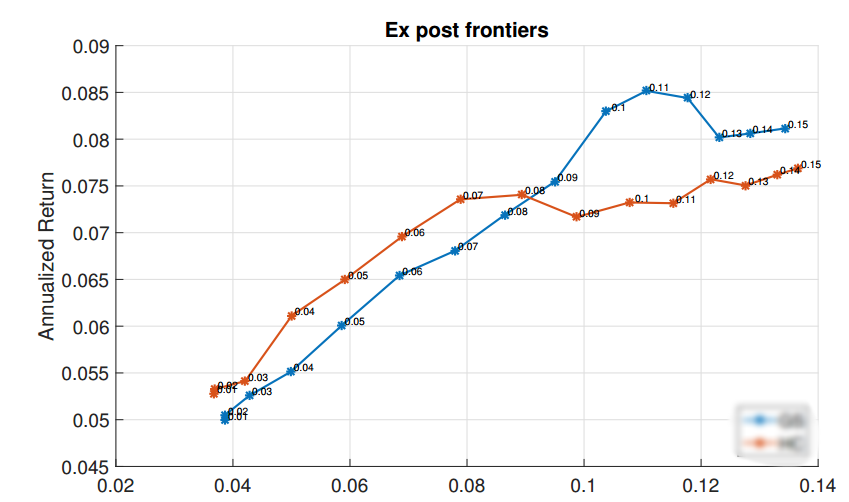Nothing is "wrong," in the sense that your findings are out of line, but there is a very deep issue that is wrong. I have written a set of papers on this. Since you are not a student, but someone trying to use this, I will explain in a lightweight manner what is wrong.
There are three main branches of statistics. In order of discovery they are the Bayesian, the Likelihoodist and the Frequentist. There are also minor schools of thought as well. The Bayesian school should really be called the Laplacian school. The Bayesian school attempts to solve the question $\Pr(\theta|X)$. The other two schools attempt to solve $\Pr(X|\theta)$, where $\theta$ is(are) some parameter(s) of interest and $X$ is a set of data.
This is important because they view different things as random. For the Bayesian school, the parameter is random in the sense that you do not know which one is the true value of the parameter. For the Frequentist school, parameters are fixed and in stochastic calculus treated as known. This is critical because humans are not imprinted with the true long run return and true long run covariance matrix.
The Black CAPM can be structured as $$\min_{s'}s'\Sigma{s}$$ subject to $$s'\underline{1}=1$$ and $$E(s'(\mu+\epsilon))=\mu_{portfolio}$$ where s is an asset allocation vector, $\mu$ is the true return, $\Sigma$ is a covariance matrix, $\underline{1}$ is a vector of ones, and $\epsilon$ is a vector of shocks. The problem is that I have proven this problem has no solution. There is no valid solution to the CAPM, because the values are not truly known.
Now that may sound picky, but there is a set of theorems behind it. Bayesian methods use statistics in a manner that is radically different from how non-Bayesian methods use them. Statistics are almost an afterthought rather than the key to the method. Because statistics are a key element to non-Bayesian methods, mathematicians began asking what makes a statistic a valid statistic. For example why isn't $\sum\sin(x_i)$ a valid estimator of a mean? Why cannot you use it? Prove it!
Abraham Wald solved this in 1940 through the complete class theorem. Anything in the class is valid and anything outside the class of solutions is not valid. He did this using Frequentist axioms. To his consternation and surprise, he found that all Bayesian solutions are inside the class. He also found that any solution that did not match the Bayesian solution, either for a particular data set or at the limit upon infinite repetition, was outside the class.
Now this is difficult to talk about unless we talk about one asset at a time. Using Markowitz's assumptions, lets imagine the wealth from one stock is well modeled by $$\tilde{w}=R\bar{w}+\epsilon.$$ This is equivalent to the time series, treating quantity of shares always a 1, to $$p_{t+1}=Rp_t+\varepsilon_{t+1}.$$ Although I have written a proof that shows for a double auction, ignoring liquidity and bankruptcy risk, the distribution of $\varepsilon$ must be normal, we will just assume normality.
A given observation of return $r_t$ can be thought of as $p_{t+1}/p_t-1.$ If we look at the reward instead $R_t=1+r_t$, then we just have future value divided by present value. If you are about to buy assets and it is time $t-1$ then under Markowitz's assumptions you cannot know the EXACT purchase or sale price. This makes the numerator and the denominator random variables that are jointly normally distributed. The distribution of the ratio of the reward is, under Markowitz's assumptions, $$\frac{1}{\pi}\frac{\Gamma}{\Gamma^2+(R_t-\mu)^2}.$$
If you calculate the expectation of R, you will find it does not exist. Therefore you cannot take expectations. The model cannot be solved as a Bayesian model using expectations, therefore the model has no valid solution in any school. There is a likelihoodist proof by White in 1958 that says that an estimator for R is the least squares operator, but the sampling distribution is the Cauchy distribution therefore no estimation process exists. The same problem exists for the Frequentists as there is no variance to minimize.
You can find formal papers on this at:
https://ssrn.com/abstract=2828744
and
https://ssrn.com/abstract=2656681.
Additionally, I have written a paper replacing the option pricing models and I am preparing a paper on subjectively optimal portfolio construction and also extending stochastic calculus using new operators.
In short, you cannot do that to find an "efficient frontier."

